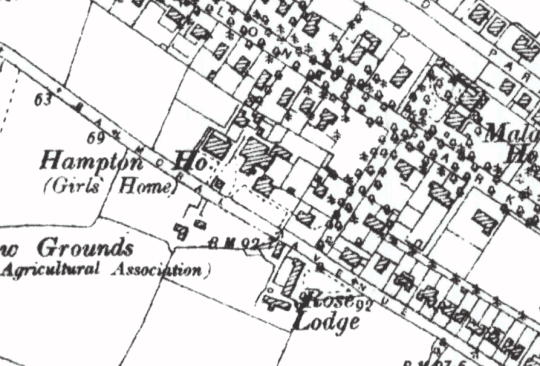Hampton House Industrial School, Belfast, Antrim, Northern Ireland
On 13 April 1874, the Hampton House Industrial School for Protestant Girls was certified for operation in premises at Balmoral Avenue, Belfast, bear to Balmoral railway station. The premises included a house, playground, garden, and two fields. Initially, accommodation was provided for 21 girls.
Miss E.L. Woodroffe had the general charge of the institution, and also of the Training Home Industrial School in Cork. Two ladies, Miss K. Thorpe and Miss Spooner, from the Church of Ireland's Deaconess Institution, County Cork, resided at Hampton House and gave their time gratuitously to the instruction and training of the children. Miss Thorpe acted as Lady Superintendent of the institution. Other staff included a qualified teacher, a laundress, and servants. A 'good English primary education' was provided, including reading, writing, dictation, arithmetic, geography and singing. An hour each day was devoted to religious instruction. The inmates were trained to be household servants. They cooked, washed, made up fine linen, made their own dresses, and were taught needlework in all its branches. They also tended and milked cows, and made butter.
In April 1874, the school was given permission to increase its capacity to 66 places. The required new buildings were completed in 1876 and provided a school-room, dormitories, as drying-room and other facilities. A major remodelling of the school was carried out in 1882 with a large plunge bath among the new additions. The number of places at the school was then increased to 100. A further enlargement resulted in the capacity being raised to 156 inmates in January 1897. Part of the accommodation was provided in five cottage homes, each housing a group of twelve girls presided over by a 'mother' who superintended the daily routine of domestic work.
An inspection of the school in 1911 recorded 146 inmates in residence, plus 9 out on licence. The staff now comprised the Lady Superintendent, Miss M.A. Keenliside; a school mistress, two assistant mistresses, technical instructress, housekeeper, assistant housekeeper, sewing mistress, assistant sewing mistress, laundry maid, nurse, and three cottage mothers. The industrial training centred on cookery, needlework, laundry-work and housewifery, although topics such as simple hygiene were now included. The girls' needlework, sewing and mending were said to be extremely neat, and their cutting-out careful and economical. Each girl, before leaving the school, was given an actual housemaid's work, care of bedrooms, passages, etc., for one month, after, which she was advanced to the role of parlour-maid, having care of sitting-rooms, dining-rooms, waiting at table, etc., for a second month. She progressed from this duty for a further month to the kitchen, where, under the housekeeper's supervision, she cooked for the teaching staff. Out of 24 girls discharged during that year, 3 found employment as housemaids, 1 as parlour-maid, 1 as nurse-maid, 10 as general servants, 1 as laundry-maid, 1 as shop assistant, 3 in factories or mills, 2 in cleaning offices, 1 returned home to assist in housework, and 1 was discharged on medical grounds.
The school site is shown on the 1901 map below.

Hampton House Industrial School site, Belfast, c.1901.
On 1 August 1924, it was announced that the school managers had resigned its certificate, and the establishment closed.
In 1928, the premises became a men's hostel for Stranmills College, known as Balmoral Hall. During the Second World War, the buildings were taken over for use as government offices, then became home to the Public Record Office of Northern Ireland. The site has now been redeveloped for residential use, incorporating part of the old buildings.
Records
Note: many repositories impose a closure period of up to 100 years for records identifying individuals. Before travelling a long distance, always check that the records you want to consult will be available.
- Public Record Office of Northern Ireland, 2 Titanic Boulevard, Titanic Quarter, Belfast BT3 9HQ.
Bibliography
- Arnold, Mavis, and Laskey, Heather Children of the Poor Clares (2004, Appletree Press)
- Barnes, Jane Irish Industrial Schools 1868-1908 (1989, Irish Academic Press)
- Dunne, Joe The Stolen Child: A Memoir (2003, Marion Books)
- Rafferty, Mary and O'Sullivan, Eoin Suffer the Little Children: The Inside Story of Ireland's Industrial Schools (1999, New Island Books)
- Touher, Patrick Fear of the Collar: Artane Industrial School — My Extraordinary Childhood (1991, O'Brien Press)
- Tyrrell, Peter and Whelan, Diarmuid Founded on Fear: Letterfrack Industrial School (2006, Irish Academic Press)
- Wall, Tom The Boy from Glin Industrial School (2015, Tom Wall)
Links
- Glencree Reconciliation Centre (former Reformatory site)
- The Commission to Inquire into Child Abuse
Except where indicated, this page () © Peter Higginbotham. Contents may not be reproduced without permission.


